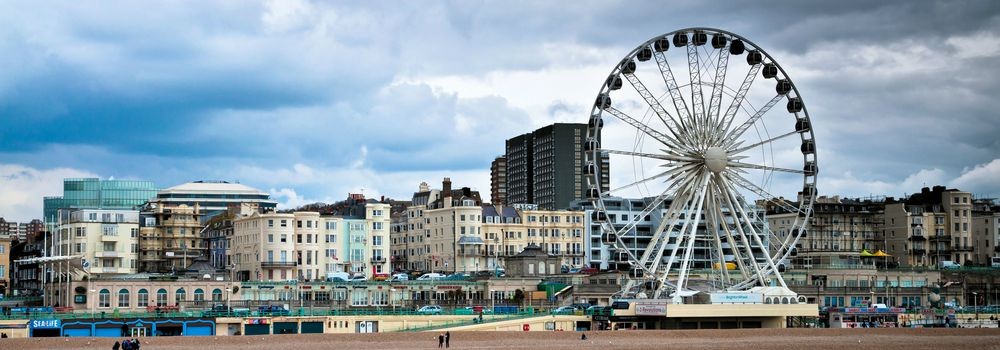Writers’ rights were placed firmly on the agenda at TUC Congress in Brighton this week (13-16 September 2015) when WGGB’s Bill Armstrong and Sue Teddern joined delegates from sister unions in the media and entertainment industries, and others representing a wide range of sectors across the UK.
In her address to Congress, TUC General Secretary Frances O’Grady said:
“Look around this hall and you will find workers from all walks of life. People whose labour creates the wealth on which Britain’s future depends.
“Scientists and engineers coming up with inventive solutions to climate change.
“Manufacturing and construction workers, rebuilding Britain.
“Entertainers and educators who inspire the next generation.
“Hi tech, energy and transport workers; not forgetting the people’s posties; who work, come rain or shine, to network the nation.
“Dedicated NHS staff who tend our sick…”
Her words were echoed by new Labour leader Jeremy Corbyn in his speech on the afternoon of 15 September 2015.
“There are six million of us in this country. We are the largest voluntary organisation in Britain. Every day we make a difference in looking after people in their ordinary lives as well as a huge contribution in the wider community. Unions are not just about the workplace, they are also about society as a whole, life as a whole, and the right of the working class to have a voice in society as a whole. That is why trade unionism is so important.”
WGGB delegate and TV Chair Bill Armstrong drew attention to the threat to the livelihoods of all workers in the creative sectors in recent years, and the WGGB campaign he has spearheaded, Free is NOT an Option, which aims to tackle the growing trend of screenwriters being expected to do increasing amounts of development work for free.
It has gained support in Westminster, at international writers’ meetings, and of a number of politicians and high-profile figures in the creative industries.
In his speech proposing the motion he called for a “rewriting of a narrative that has held sway for decades…
“Fair and responsible investment in the human resources that have made and continue to make our creative industries the envy of the world is NOT an unaffordable extravagance. It is fundamental to the success of a sustainable, healthy industry. AND it is in everyone’s interests.”
WGGB delegate and TV and radio dramatist Sue Teddern spoke in support of a motion against threats to the BBC.
Talking about the corporation’s radio output she said:
“I am here to speak up for the poor relations of prime-time, big bucks, water-cooler TV… And that’s BBC radio drama and comedy.
“Writers have been belt-tightening and salami-slicing for years. Radio 4 broadcasts over 600 hours of first-run drama each year. But budgets are stretched to breaking point…
“SO. Enjoy The Archers as you microwave your lasagne. Chuckle to a new comedy when you’re stuck in a four-mile tailback on the M25.
“But when the salami is sliced right up to that nasty bit of string at the end, these are the treasures of British culture we will ALL lose. We MUSTN’T let that happen.”
TUC Delegates approved a motion rejecting the Trade Union Bill, which passed its second reading in the Commons on the second day of Congress, and backed a day of action against the bill.
Shami Chakrabarti, Director of human rights organisation Liberty, speaking on the final day of Congress, said:
“The new Trade Union Bill and imminent threat to the Human Rights Act represent a spiteful and ideological attack on rights and freedoms that must have Disraeli and Churchill spinning in their graves…
“These attempts to divide, rule and dominate ordinary people in different sectors of the economy and different parts of the world are neither democratic nor conservative, and I urge all thoughtful ‘one nation’ parliamentarians to defeat them.
“Government as legislator is simply abusing its power over the statute book to allow it to abuse its power as a big employer. If it wants to avoid disruption to public services it should look after its workforce, not make pathetic attempts to demonise it in the eyes of the rest of the people.”
And referring to the TUC’s campaign against the bill, Frances O’Grady said:
“Earlier this year the Prime Minister went to Washington and paid homage to the civil rights leader, Martin Luther King. He visited the monument. He called him the Great Man. But he doesn’t seem to know much about Doctor King; his beliefs and what he stood for. So here is what Doctor King said about unions. He said:
‘The labour movement does not diminish the strength of a nation but enlarges it.
‘By raising the living standards of millions, labour miraculously created a market for industry and lifted the whole nation to undreamed of levels of production.
‘Those who attack labour forget these simple truths. But history remembers them’.”
She added: “History will remember this Conservative government’s Trade Union Bill as the biggest attack in 30 years. Not just against trade unions. But against our best chance of raising productivity, pay and demand… But I can tell you this, the Government has woefully miscalculated the resilience of working people and their unions.
“Because let me make it clear – and let’s send a message from this hall – with every ounce of our strength, we will oppose this Trade Union Bill.”
Writers’ Guild of Great Britain motions

Free is NOT an Option (passed on Tuesday 15 September 2015 – read Bill Armstrong’s speech)
Congress notes with concern a growing trend in which writers and other creative workers are expected to do a large amount of work for nothing.
A survey by WGGB found that 87% of respondents in the TV and film industries reported a significant increase in the amount of work they had been asked to do for free. Authors, poets and playwrights also reported this practice.
Free work is routinely expected in the development stage of a project. Weeks of time-consuming research and preparatory work are required, with no pay. TV “shadow schemes” require
writers to create entire scripts for nothing or very little money before a paid commission will even be considered. In many cases, the free work does not lead to any paid work at all.
If so much of a writer’s work has to be done for free, the only people who can afford to enter the business or remain in it are those who have independent financial resources, and the only stories that get told will be those of the wealthy.
Similar issues face performers, musicians and other creators.
Congress supports the “Free is NOT an Option” campaign launched by WGGB, and calls on the General Council to consult all unions in the cultural and entertainment industries and work with them to stamp out this unfair practice.

Future of the BBC (motion passed on Sunday 13 September 2015 – read Sue Teddern’s speech)
Congress is alarmed at the Government’s destructive approach to the future of the BBC, which proposes to strangle our much-admired public service broadcaster to the detriment of viewers and listeners, creators and other workers, and the UK; but to the advantage of non-dom tycoons and global media corporations.
The licence fee settlement announced in July 2015 was negotiated in secret, without a shred of public consultation or debate, and is inadequate to secure the future of the BBC.
The panel appointed by the Culture Secretary to advise on Charter renewal consists largely of enemies and critics of the BBC, and includes representatives of vested interests that will benefit from a much-reduced BBC.
The green paper issued by the Government is a thinly disguised plan to reduce the BBC to something akin to American public service broadcasting (which gets much of its best drama and documentaries from… the BBC!)
Congress calls on the General Council to use all its efforts to campaign on behalf of the union movement and in collaboration with other organisations, to save the BBC as we know it for future generations.
A full list of Congress decisions on motions can be found on the TUC website.
Above photo: Shutterstock.com/Ulrich Mueller

